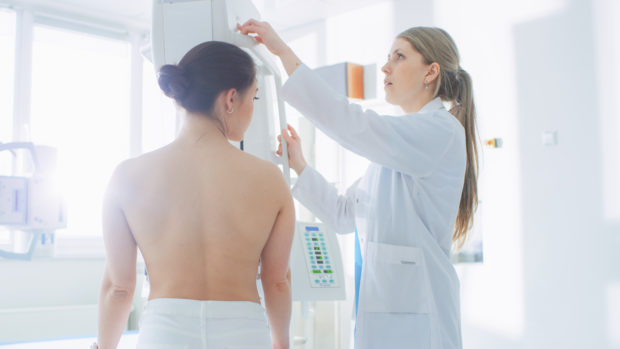
Almost a million British women, including tens of thousands of Scots, have “missed” a breast cancer screening appointment because of the Covid-19 pandemic, a charity has estimated.
Breast Cancer Now said that thousands of cancers could be undetected with their diagnosis delayed.
Breast cancer screening services were paused during the height of the pandemic to reduce the risk of the spread and help free up emergency NHS resources.
And now services have begun to resume, the charity has expressed concern over the number of women caught up in the backlog.
It has estimated that 986,000 women across the UK missed their mammograms due to breast screening programmes being paused.
This breaks down to almost 838,000 women in England, 78,000 in Scotland, 48,000 in Wales and 23,000 in Northern Ireland.
Among these women, the charity estimates that there could be 8,600 women who are now living with undetected breast cancer.
It said that services have resumed at different speeds across the country.
The charity has called on NHS bodies across the UK and the Government to set out how they plan to tackle an anticipated rise in demand for imaging and diagnostics.
Baroness Delyth Morgan, chief executive at Breast Cancer Now, said: “That nearly one million women across the UK were caught up in the backlog waiting for breast screening is cause for grave concern as we know that around 8,600 of these women could have been living with undetected breast cancer.
“Mammograms are a key tool in the early detection of breast cancer, which is critical to stopping women dying from the disease.
“We understand that the breast screening programme was paused out of necessity due to the global Covid-19 pandemic, but we must now press play to ensure that all women can access breast screening, and we cannot afford for the programme to be paused again.
“Governments and NHS health bodies across the UK must set out how the influx in demand for imaging and diagnostics will be met.”
The figures come as new information from European Breast Cancer Conference shows that older women can “tolerate” breast cancer surgery “generally well”.
Women with breast cancer who are aged older than 70 years are sometimes not offered surgery, chemotherapy or radiotherapy because doctors believe their patients will not be able to tolerate these treatments.
But new research, led by the University of Sheffield, examined data on women treated in British cancer centres.
“For most women, surgery is well tolerated and should be the aim of treatment if possible, as we have shown that surgery is generally well tolerated and survival rates are slightly lower in women who do not have surgery,” said Lynda Wyld, professor of surgical oncology.
Meanwhile a separate report from Cancer Research UK has laid bare the stark inequalities among people from richer and poorer backgrounds when it comes to cancer diagnoses.
The charity has estimated that, if all areas had the same cancer rates as the most well off, the number of cancer cases diagnosed across the UK each year could drop by more than 20,000.
As well as inequalities among the number of cancer cases, the charity said that people from more deprived areas face more difficulties accessing cancer services and are less likely to survive their disease.
Michelle Mitchell, Cancer Research UK’s chief executive, said: “For most cancer types, people from poorer areas have worse survival.
“Government must work harder to prevent cancer, and improve people’s chances of surviving, no matter their postcode.
“The inequalities that exist in the UK are unacceptable and must be addressed to prevent unnecessary death.”

Enjoy the convenience of having The Sunday Post delivered as a digital ePaper straight to your smartphone, tablet or computer.
Subscribe for only £5.49 a month and enjoy all the benefits of the printed paper as a digital replica.
Subscribe